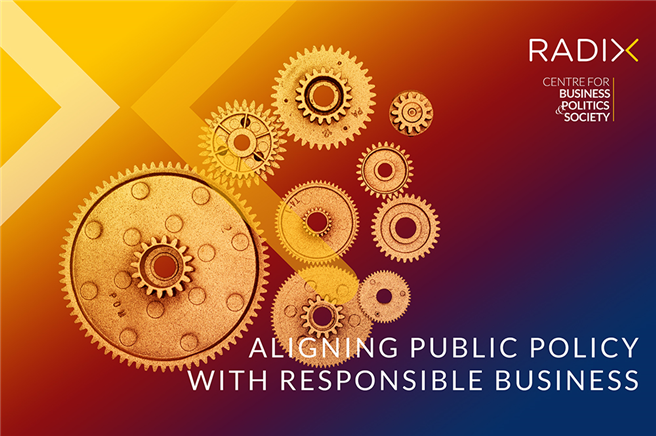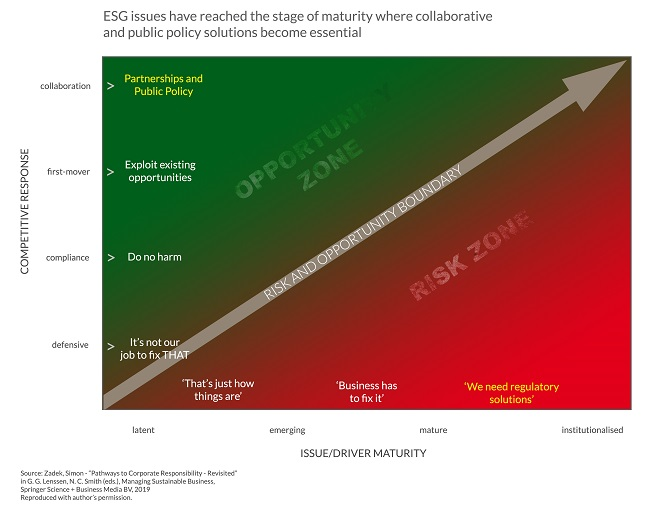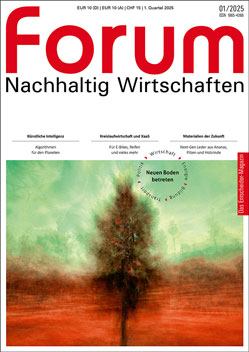The Post-COVID-19 World
Riding the wave of opportunity
The COVID-19 pandemic has upended life as we know it. People are dying. Economies are in freefall. Business is struggling to survive. We are all incarcerated. Global supply chains are under strain. It's not only health care systems gearing up with ventilators and critical care beds for the ill, governments are pouring trillions of euros/dollars/pounds/whatever to put our whole economies and our societies in intensive care.
 The hope is that this acute phase will only last a few months, and many have started looking beyond the acute crisis to what it can teach us about the sort of economy and society we can build after the crisis. Here, too, there are different narratives.
The hope is that this acute phase will only last a few months, and many have started looking beyond the acute crisis to what it can teach us about the sort of economy and society we can build after the crisis. Here, too, there are different narratives.One is the belief that the crisis has shown up in glorious technicolour the faults of our current system of political economy. That we have traded resilience for short term economic efficiency. That issues like business responsibility to society, the threats of climate change, and issues of sustainability can no longer be ignored. That the pandemic is a painful but stark reminder that we have to change our ways and that a new economic and social settlement, while embryonic, has a chance to emerge.
Which narrative do you believe?
There is an alternative narrative. One that says that the damage to business and our economy, the massive debts that will be accumulated in this crisis, the large social dislocations we are experiencing, all mean that, after the acute phase, the whole focus will be on engineering a recovery that is as quick as possible – whatever it takes.
That devastated businesses will push questions related to social and environmental responsibility out of the way as their focus turns to survival and re-building. That, with governments now sinking beneath the new ocean of debt, any hopes of massive expenditures on climate related issues or a fiscally driven 'Green New Deal' have vanished. That sustainability will become a second order issue as everyone tries to regain some semblance of normality in their lives.
The reality is that both these narratives have merit. And both could come to pass.
For those of us interested in issues of social responsibility and sustainability, it is important, therefore, to be realistic, sensible and shrewd in pursuing our agenda. If we're lucky, we may enter a stage where all received wisdom, all conventional ways of doing things will be more open to question than they have been. The opportunity lies in riding that wave without ignoring the real, short-term hardships that many are facing.
Business, Politics & Society
It is to address these issues that we have recently launched the RADIX Centre for Business Politics & Society – a not-for-profit entity based in Amsterdam with a pan-European focus and part of the RADIX network of public policy think tanks. The Centre's work is based on the premise that, as the adjacent figure shows, public policy responses become essential when solely competitive activity has run its course, and when the issues at stake have reached the level of maturity that requires institutional support.

Individual company efforts at building sustainability and social responsibility into their business models are essential and to be fostered. Some have even gained [temporary?] competitive advantage from doing so. But, as the actions required become more systemic, the risk increases that, without public policy action, those that are ahead of the curve on social and environmental responsibility find themselves competitively disadvantaged. Public policy is always years behind the times. ESG issues are now reaching the level of maturity that require meaningful public policy action to generate the multiplier effect needed for them to become systemically embedded. We are therefore interested in working with those companies, groups, and individuals who are leaders in social and environmental responsibility and good governance. To understand how changes in public policy could help their efforts, put them at an advantage rather than a disadvantage, and develop programmes that can drive public policy in that direction. Our aim is 'Aligning Public Policy with Responsible Business'. Until this alignment happens, progress on issues of business responsibility and sustainability will remain piecemeal, slow, and plagued by two steps forward and one step back – if we're lucky. The time for that is well past.
"The future is not a gift. It is an achievement.”
Robert F. Kennedy
The Opportunity is Now
As this crisis originated in China, maybe it is also time to look at some Chinese wisdom. As President John F Kennedy put it: "The Chinese use two brush strokes to write the word 'crisis.' One brush stroke stands for danger; the other for opportunity. In a crisis, be aware of the danger -- but recognize the opportunity.” We should recognize the opportunities that come with the current crisis. But we must do so cleverly and effectively.
Our response needs to be politically sensitive if it is to be effective. It must recognize that we will be operating in a very difficult political climate. A situation where governments are struggling just to hold things together, to prevent large swathes of their populations from sinking into poverty and hardship. Where engineering an economic and social recovery will, rightly, be the prime focus.
Any public policy change will therefore need to ride that wave. It has to make a real contribution to the short-term recovery efforts while credibly building in longer term reform that is practically and politically achievable. It's a tall order. It won’t be easy. But there is no other choice. That is why we need your help.
Many of the readers of this magazine have spent much time and effort focusing on sustainability issues. They have worked hard to build well-governed businesses that take their environmental and social responsibilities seriously. In the process, they have learned a lot about viable ways forward as well as about the real, practical difficulties of moving in those directions.
We would like to invite you to be part of our community; to share your experiences, and work with us to influence public policy so that companies and groups like yours can thrive; to find ways in which your positive achievements can be multiplied several times over through public policy initiatives that will drive the whole of the business world in the same direction. Your accumulated knowledge and experiences are invaluable. Now is the time to leverage them. We recognise that there are many initiatives underway to address some of these issues. Our aim is to provide a platform where these multiple initiatives can meld. A safe space where business, civil society, and government can come together to address, in depth and with no pre-conceptions, the structural issues that hinder progress towards a sustainable future.
An Entrepreneurial Approach
While there is much discussion on specific interventions, there is insufficient focus on the bigger, structural questions. How are markets structured? Does the regulatory framework in different sectors create the right incentives for sustainability and corporate responsibility? Is it appropriate to delegate corporate governance oversight to the investment community? What are the political obstacles to change and how can they be overcome?
We call this approach an entrepreneurial approach to policy making. Entrepreneurs imagine a different future and then work backwards to get there from where we are now. This complements the more common approach in larger organisations – whether commercial or governmental – that tend to start from where we are now and work out how to make improvements going forward.
To this end, we would welcome your help in imagining the alternative future in your sector. To generate discussions where there are no sacred cows; where everything can be challenged; where our ability to imagine the new is more important than endless analysis of data about the past. To energise. To generate enthusiasm about what can be rather than bemoaning what is.
"Progress occurs when courageous, skillful people seize the opportunity to change things for the better."
Harry Truman
We have a responsibility to find solutions
We have a responsibility to come up with solutions that are both practically and politically viable. Otherwise we're all just whistling in the wind. President Harry Truman said that "Progress occurs when courageous, skillful people seize the opportunity to change things for the better." Readers of this magazine are courageous, skillful people. And we all have the opportunity to change things for the better. We can only do so if we are seen to be part of the solution given the realities of the post-COVID-19 world. It is a time of opportunity for well thought-out, practicable and politically attractive initiatives that could, over time, drive change for the better. We invite you to join us in driving forward this endeavour. Contact us on hello@radixcbps.org. Bring your skills to bear on driving practicable and sustainable change so that we do not, once again, miss the opportunities opened up by what is probably the most significant dislocation since the Second World War.
The time is now. The solution is you.
Dr Joe Zammit-Lucia is an entrepreneur and leadership advisor whose interests lie at the intersection between politics and business. He is a Founder of RADIX – the think tank for the radical centre and the RADIX Centre for Business, Politics & Society.
Contact: RADIX Centre for Business, Politics & Society, Dr. Joe Zammit-Lucia
hello@radixcbps.org | www.radixuk.org | www.radixcbps.org
hello@radixcbps.org | www.radixuk.org | www.radixcbps.org
Wirtschaft | Verantwortung jetzt!, 04.05.2020

Pioniere der Hoffnung
forum 01/2025 ist erschienen
- Bodendegradation
- ESG-Ratings
- Nachhaltige Awards
- Next-Gen Materialien
Kaufen...
Abonnieren...
03
JAN
2025
JAN
2025
48. Naturschutztage am Bodensee
Vorträge, Diskussionen, Exkursionen mit Fokus: Arten-, Klima- und Naturschutz
78315 Radolfzell
Vorträge, Diskussionen, Exkursionen mit Fokus: Arten-, Klima- und Naturschutz
78315 Radolfzell
17
JAN
2025
JAN
2025
Systemische Aufstellungen von Familienunternehmen und Unternehmerfamilien
Constellations machen Dynamiken sichtbar - Ticketrabatt für forum-Leser*innen!
online
Constellations machen Dynamiken sichtbar - Ticketrabatt für forum-Leser*innen!
online
06
FEB
2025
FEB
2025
Konferenz des guten Wirtschaftens 2025
Mission (Im)Possible: Wie Unternehmen das 1,5-Grad-Ziel erreichen
80737 München
Mission (Im)Possible: Wie Unternehmen das 1,5-Grad-Ziel erreichen
80737 München
Professionelle Klimabilanz, einfach selbst gemacht

Einfache Klimabilanzierung und glaubhafte Nachhaltigkeitskommunikation gemäß GHG-Protocol
Megatrends
 Deutsche (Männer) lesen immer weniger
Deutsche (Männer) lesen immer wenigerChristoph Quarch wünscht sich eine Kampagne von Buchhandel und Politik, um Leser zurückzugewinnen
Jetzt auf forum:
Profiküche 2025: Geräte-Innovation spart mehr als 50 Prozent Energie für Grill-Zubereitung ein
Sichere Abstellmöglichkeiten für Fahrräder:
Fotoausstellung Klimagerecht leben
Ohne Vertrauen ist alles nichts
The Custodian Plastic Race 2025
Niedriger Blutdruck: Wie bleibt man aktiv, ohne sich schwindlig zu fühlen?
















